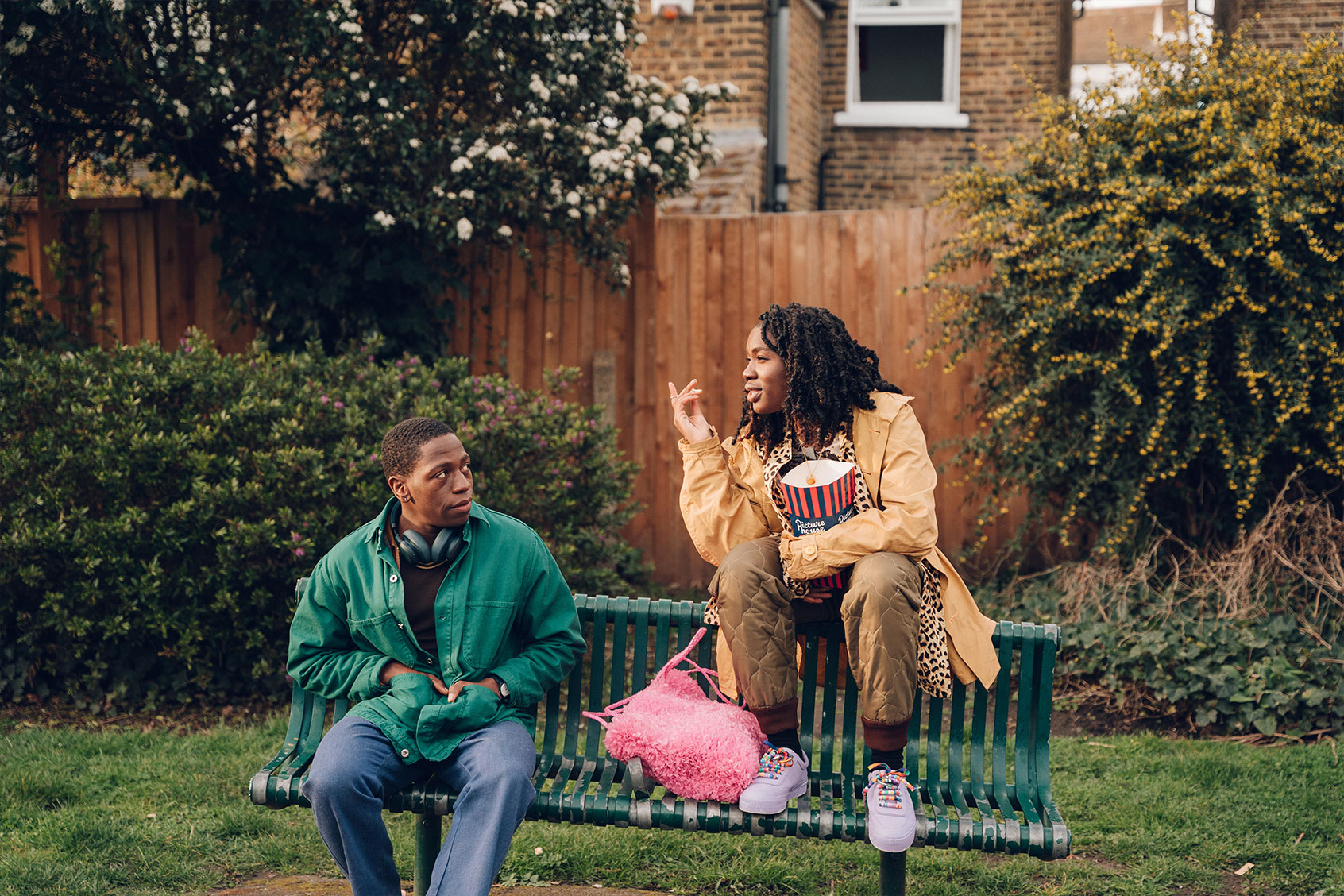Hulu’s rom-com “Rye Lane” starts in one of the most emotionally charged places ever: the bathroom. In this all-genders bathroom at an art show, a daring overhead shot reveals people in each stall taking part in various activities: trying to solidify cryptocurrency deals, taking selfies, changing diapers and dealing with the negative results from a fun night out. Dom (David Jonsson) is sobbing in the last stall, trying to recover from how quickly his previous partner, Gia (Karene Peter) has moved on — with his best friend, Eric (Benjamin Sarpong-Broni).
Throughout the film, there isn’t a lid on Dom’s emotions, even when others want one to be.
Dom’s face is tear-stained, and he tries his best to contain his loud cries under his hand as he asks, “Why?!” while tapping through Instagram Stories of the couple painting the walls in the apartment he and Gia used to share, making cutesy couples Boomerangs in bed and proudly showing off their new union.
The hilarious, and slightly embarrassing scene, comes courtesy of Raine Allen-Miller, whose directorial debut centers on the story of two recently single strangers. Yas (Vivian Oparah), who overhears Dom crying in the bathroom, later befriends him in the art gallery, inspiring the two to spend a whole day together in South London. They traipse around Brixton and Peckham, baring their hearts, swapping relationship stories and finding new love within each other along the way.
Opening the movie with Dom wallowing in misery is one of the more progressive takes on post-breakup behavior portrayed in popular media. Male characters are often told to toughen up when dealing with sad situations, and are not allowed to feel a full range of emotion. Whereas female characters in the same situation are usually portrayed as overly emotional, crying over old photographs with a pint of Ben & Jerry’s in one hand and a bottle of wine in the other. Or, they’re the bitter ex, keying cars and burning the clothes of their past lover.
Everyone has cried over an ex, everyone has cried in the bathroom, but this phenomenon is usually not permitted to Black men. While Black men being vulnerable onscreen is not necessarily something new, the instances are few and far between. The good news is that the portrayals are increasing.
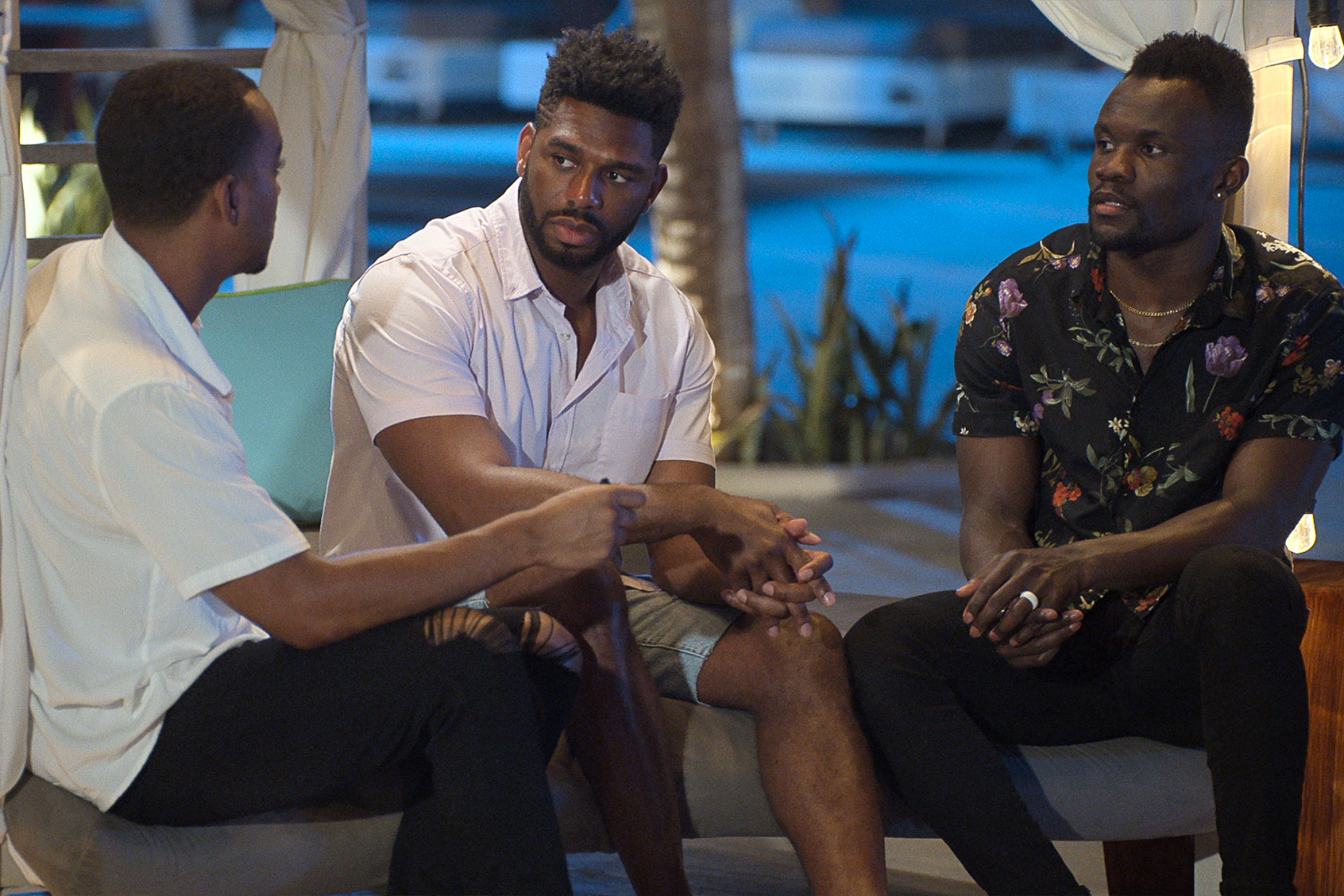 Marshall, Brett and Kwame on “Love Is Blind” (Netflix)
Marshall, Brett and Kwame on “Love Is Blind” (Netflix)
We see this in the most recent season of Netflix’s “Love Is Blind” reality dating series. With the way the experiment is structured, singles form bonds with other singles sight unseen through talking in the “pods,” being honest about their experiences and desires in hopes of becoming engaged, when they can finally see each other. “It’s as if placing a boundary in between people has actually removed a boundary” says Paul, one of the participants this season.
Three Black men – Kwame, Marshall and Brett – end up in the final couples that the show focuses on and exemplify the goals of the experiment early on. Speaking in the pods for several hours and without the pressures of societal expectations makes it easy for these hopeful singles to be vulnerable with their potential partners. They share fears of not being accepted for who they are, parenting issues they’ve faced and experiences with poverty growing up.
It’s portrayals like these that break up the more stereotypical attributes, roles and personalities associated with Black men in the media – whether it be the hardened drug-dealer or the famous athlete. Dom’s character in “Rye Lane” allows him to be added to a short, yet mighty, roster of similar characters.
Throughout the film, there isn’t a lid on Dom’s emotions, even when others want one to be. After pulling himself together in the bathroom, he joins his friend Nate (Simon Manyonda) in the art gallery and tries to portray a sense of calm, but ends up expressing his discontent with the swiftness in which Gia has erased him. As he continues ranting about how Gia’s repainting walls that he “already broke his back painting” – and then finds out about Nate attending Gia and Eric’s house-painting party – Dom loudly wails, “F**k!” in the middle of the gallery.
“Black men may have a desire to be vulnerable in their relationships but that is often suppressed by the need to keep up with a hypermasculine image.”
Nate doesn’t see the situation as big enough of a deal to be visibly upset about. Instead of validating Dom’s emotions, Nate tells his friend to calm down or else he’d “sling a sign on [him and] call it performance art,” operating as the male friend who tells you that being overly emotional isn’t becoming of the gender, versus helping a friend that is looking to be open about their feelings without judgment.
The pressue to hide any emotions that aren’t positive or from a place of anger is rooted in the hypermasculinzation of Black men, which can be detrimental to mental well-being.
“Black men may have a desire to be vulnerable in their relationships but that is often suppressed by the need to keep up with a hypermasculine image,” Marquita S. Myrick, NCC, LPC, LMHC, a Black therapist based in Tampa, FL, told Salon.
Hypermasculinty is the exaggeration of stereotypical behaviors that society has deemed to be appropriate for men and boys. From acts of violence to sexual aggression, these traits are pushed on to men through personal experiences as well as media representation. For Black men, hypermasculinity is also rooted in racism, as they’ve been depicted as inherently violent and aggressive beings since colonial times.
The depiction of Black men as hypermasculine and less emotional pushes them to believe the idea that they need to reflect a sense of strength, when they may not be feeling strong at all. This prevents them from seeking the help they need, whether it be from community or a professional.
Myrick shared that while her clientele does not include many Black men, there was a definite increase in demand for therapy from them after the summer 2020 Black Lives Matter events in which multiple Black men lost their lives to police violence.
“Prior to that I didn’t have any Black males on my caseload but that event led to years’ worth of therapy supporting Black men in unraveling their own history of abuse and neglect,” said Myrick.
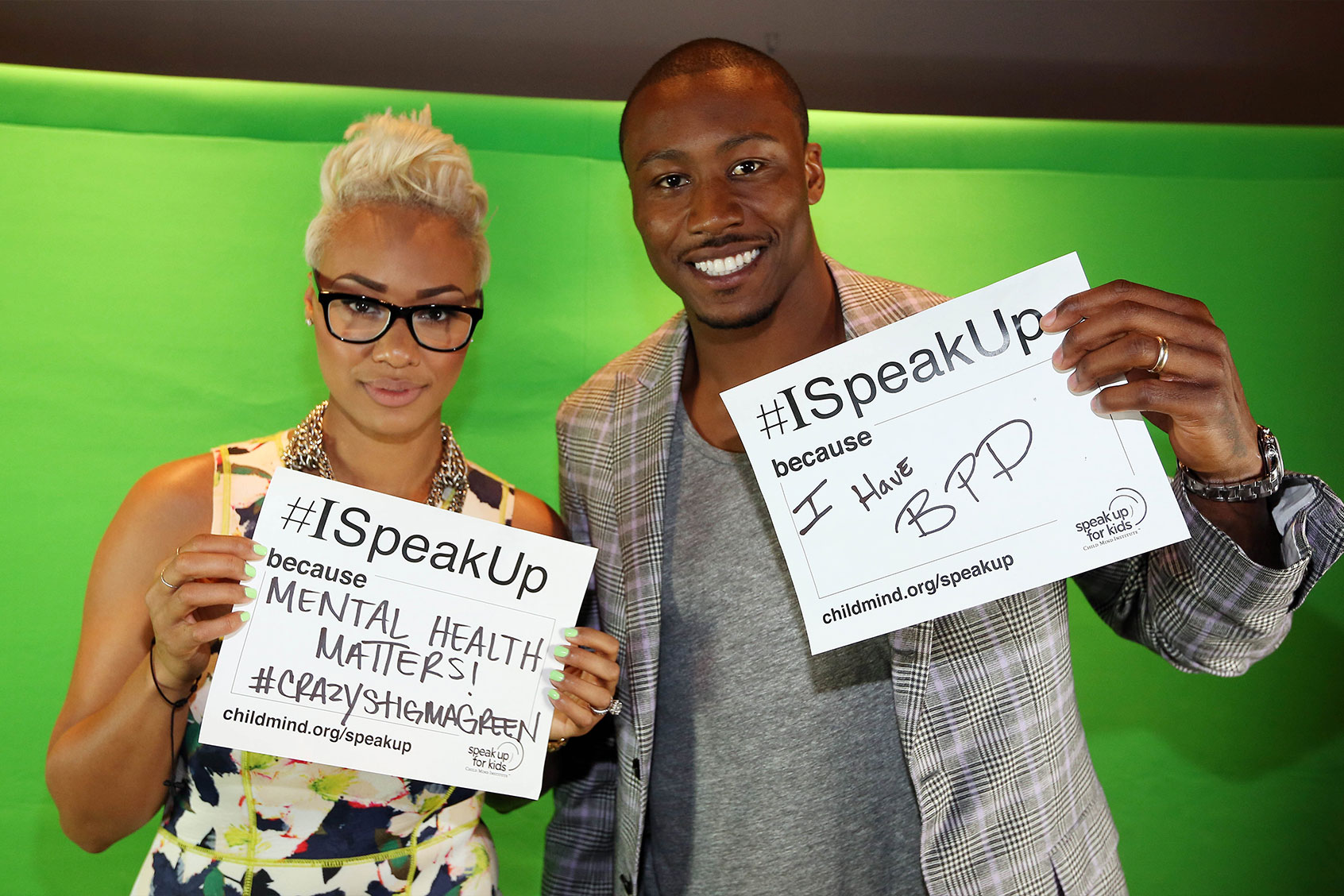 Marshall and Brandon Marshall attend Speak Up For Kids Mind The Gap: Integrating Physical & Mental Heath Care presented at Museum of Science and Industry on May 21, 2014 in Chicago, Illinois. (Tasos Katopodis/Getty Images for Child Mind Institute)
Marshall and Brandon Marshall attend Speak Up For Kids Mind The Gap: Integrating Physical & Mental Heath Care presented at Museum of Science and Industry on May 21, 2014 in Chicago, Illinois. (Tasos Katopodis/Getty Images for Child Mind Institute)
Examples of receiving help, whether it be onscreen or off, from community or mental health professionals, are extremely important in order to flip the script.
The topic of therapy and mental health are taboo within the Black community, but in recent years public figures have began to advocate strongly in favor of it. In 2020, Big Sean, an award-winning rapper, openly spoke about his battle with anxiety and the practices he does to mitigate it. NFL Star Brandon Marshall shared how growing up he was told to “never show any signs of weakness” and that his Borderline Personality Disorder diagnosis prompted him to strive towards de-stigmatizing mental health in his community.
Examples of receiving help, whether it be onscreen or off, from community or mental health professionals, are extremely important in order to flip the script on the narrative that Black men can only be strong and nothing else. Dom receives his help from Yas with her companionship throughout the day, as he slowly comes out of the shell that the breakup put him in.
As they walk around South London, Dom tells Yas that he’ll be meeting both Gia and Eric, who he hasn’t seen in three months since the breakup. When Yas reveals that she too is recovering from a breakup, he asks her if she woke up every day “and [laid] there trying to muster up energy to breathe.”
At this point in the film, Yas is still a relative stranger to Dom, but he feels comfortable enough to want to connect with her on a shared experience. Even though Yas does not reciprocate his exact post-breakup sentiments, she doesn’t dismiss his feelings, which allows him to continue sharing his disappointment that while he thought he and Gia were “better than fine” during the course of their six-year relationship, clearly Gia did not feel the same way.
But when Dom meets Gia and Eric to “clear the air,” they tell Dom they want this to be “put behind them” so they don’t feel guilty every time they think about him. With this proposal, the couple acts in a similar fashion to Nate, requesting that Dom put his feelings aside for the comfort of others. Rather than go against norms and give Dom the space to rightfully grieve his lost relationship, they’re more concerned about their personal feelings. As a result, they end up aiding in the stereotype of the hardened man that’s been placed on Black men.
In “Love Is Blind,” a similar situation occurs between Marshall and Jackelina, one of the couples who makes it out of the pods to see if their engagement will lead to marriage.
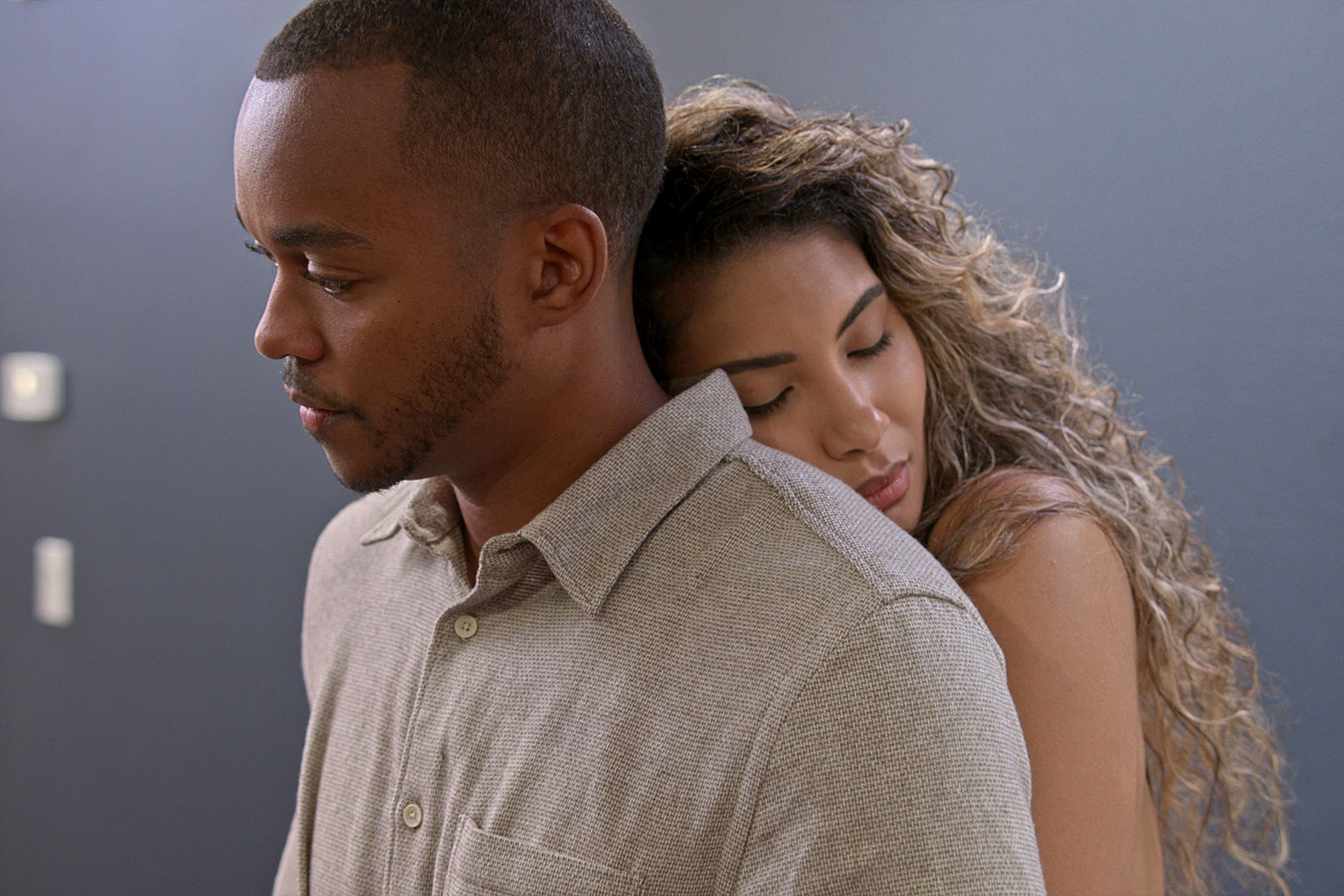 Jackelina hugs Marshall on “Love Is Blind” (Netflix)
Jackelina hugs Marshall on “Love Is Blind” (Netflix)
Marshall from the beginning is very open with his feelings when interacting Jackelina, and that doesn’t waver. His willingness to hold space for her fears, how expressive he is with his love for her, these are things that Jackelina cites as what initially draws her to him. “He is emotionally available, he’s able to handle my spiciness my attitude, he knows how to make me feel good and solid,” she says in earlier in the show.
However, once they’re out of the pods and reenter the real world, Jackelina ends up playing a different tune, blaming the dissolution of her and Marshall’s relationship on the idea that he’s too soft. She complains about Marshall’s lack of aggression in the bedroom and compares him to Josh, another man she was chatting with in the pods. She sees Josh as being on the “the same level as [her]: strong, masculine and tough,” traits that Marshall did not outwardly possess in her eyes.
Her switch-up reinforces stereotypes that are told to men about what women want: men who will provide, who are strong and are tough in the face of adversity. It signals to those who are the opposite, who are maybe more emotionally intelligent, that their EQ, their vulnerability is unattractive – which is harmful to both parties at the end of the day. It is why characters like Dom are needed to push back on those ideas, for the sake of anyone looking to enter a relationship, whether platonic or romantic, so they’re aware of what is healthy even if it isn’t what society deems as “attractive.”
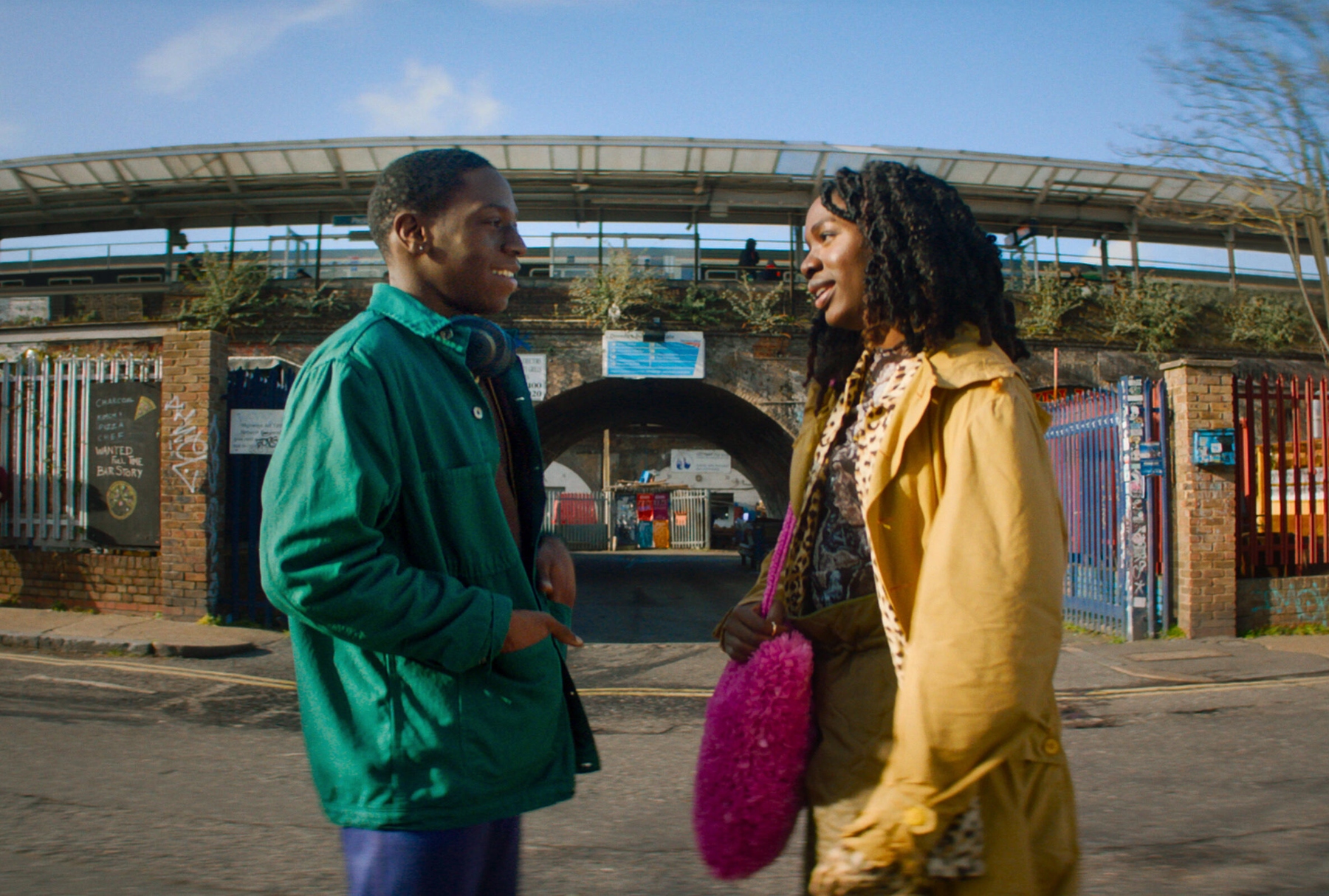 David Jonsson and Vivian Oparah in “Rye Lane” (Searchlight Pictures)
David Jonsson and Vivian Oparah in “Rye Lane” (Searchlight Pictures)
No toughening up necessary to get the girl in the end.
Over the course of “Rye Lane,” Dom is provided the agency to reflect, lament and eventually, get over his past relationship. While others would rather he get over the situation quickly, he holds true to his emotions and takes his time working through them, whether it be by swapping anecdotes with Yas or listening to a playlist of sad songs he made in order to cope. It is Dom’s willingness to be himself, rather than hiding how he really feels, that aids the lightheartedness and authenticity of the film. And ultimately, it’s his openness that attracts Yas to him. No toughening up necessary to get the girl in the end.
“Rye Lane” is a breath of fresh air, not only to the rom-com genre, but to the tired characterizations of Black men that we see in the media. It shows that it’s OK to not be OK, it’s OK to lean on others, and sometimes you just need to cry in the public restroom to start your healing journey.
